Contents
| |||||
| Decades: | |||||
|---|---|---|---|---|---|
| See also: | Other events of 1919 List of years in Belgium | ||||
Events in the year 1919 in Belgium .
| |||||
| Decades: | |||||
|---|---|---|---|---|---|
| See also: | Other events of 1919 List of years in Belgium | ||||
Events in the year 1919 in Belgium .

Albert I was King of the Belgians from 23 December 1909 until his death in 1934.

Elisabeth of Bavaria was Queen of the Belgians from 23 December 1909 to 17 February 1934 as the wife of King Albert I, and a duchess in Bavaria by birth. She was the mother of King Leopold III of Belgium and of Queen Marie-José of Italy, and grandmother of kings Baudouin and Albert II of Belgium, and Grand Duchess Joséphine-Charlotte of Luxembourg.
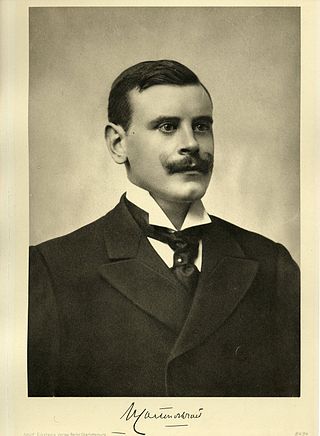
Henry Victor Marie Ghislain, Count Carton de Wiart (1869–1951) was a Belgian writer and statesman who served as the Prime Minister of Belgium from 20 November 1920 to 16 December 1921.
Émile Leon Cammaerts CBE was a Belgian playwright, poet and author who wrote primarily in English and French.

Désiré Félicien François Joseph Mercier was a Belgian cardinal of the Catholic Church and a noted scholar. A Thomist scholar, he had several of his works translated into other European languages. He was known for his book, Les origines de la psychologie contemporaine (1897). His scholarship gained him recognition from the Pope and he was appointed as Archbishop of Mechelen (Malines), serving from 1906 until his death, and was elevated to the cardinalate in 1907.
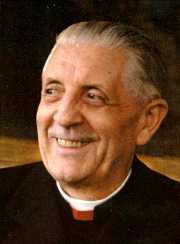
Leo Jozef Suenens was a Belgian prelate of the Catholic Church. He served as Archbishop of Mechelen-Brussels from 1961 to 1979, and was elevated to the cardinalate in 1962.

Joseph Leo Cardijn was a Belgian Catholic cardinal and the founder of the movement of Young Christian Workers.

Maurice Marie Charles Joseph De Wulf (1867–1947), was a Belgian Thomist philosopher, professor of philosophy at the Catholic University of Leuven, was one of the pioneers of the historiography of medieval philosophy. His book History of Medieval Philosophy appeared first in 1900 and was followed by many other editions and translations.
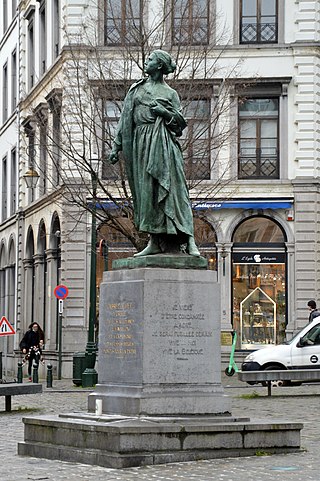
Gabrielle Alina Eugenia Maria Petit was a Belgian spy who worked for the British Secret Service in German-occupied Belgium during World War I. She was executed in 1916, and was widely celebrated as a Belgian national heroine after the war's end.
The Civic Decoration is a civilian decoration of the Kingdom of Belgium. It was first established by royal decree on 21 July 1867 to reward exceptional acts of bravery, devotion or humanity. A further royal decree of 15 January 1885 extended the award to state civil servants for long service by a mere change of ribbon. The award statute was once again amended by royal decree in 1902 to include long service in the Civic Guard and firefighters, each with its distinctive ribbon.
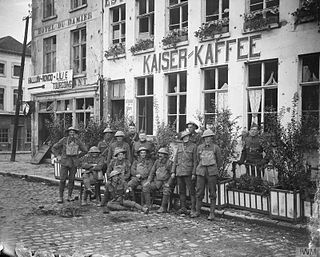
The Battle of the Lys and the Escaut was the third and last phase of the Second Battle of Belgium or the Ypres-Lys Offensive, and took place in Belgium between 20 October and 11 November 1918.

The Commemorative Medal of the 1914–1918 War was a Belgian commemorative war medal established by royal decree on 21 July 1919 and awarded to all members of the Belgian Armed Forces who served during the First World War that were eligible for the inter-allied victory medal.
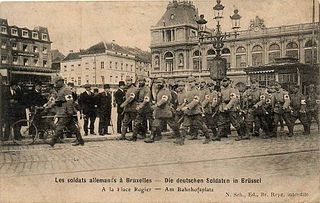
The German occupation of Belgium of World War I was a military occupation of Belgium by the forces of the German Empire between 1914 and 1918. Beginning in August 1914 with the invasion of neutral Belgium, the country was almost completely overrun by German troops before the winter of the same year as the Allied forces withdrew westwards. The Belgian government went into exile, while King Albert I and the Belgian Army continued to fight on a section of the Western Front. Under the German military, Belgium was divided into three separate administrative zones. The majority of the country fell within the General Government, a formal occupation administration ruled by a German general, while the others, closer to the front line, came under more repressive direct military rule.
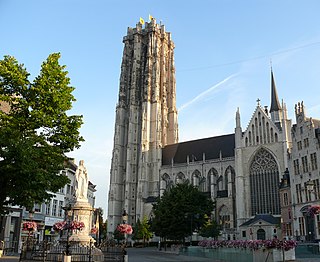
The Archdiocese of Mechelen–Brussels is a Latin Church ecclesiastical territory or archdiocese of the Catholic Church in Belgium. It is the primatial see of Belgium and the centre of the ecclesiastical province governed by the Archbishop of Mechelen–Brussels, which covers the whole of Belgium. It was formed in 1559 and the bishop has a seat in two cathedrals, St. Rumbold's Cathedral in Mechelen and the Cathedral of St. Michael and St. Gudula in Brussels. The current archbishop is Luc Terlinden, who was installed in September 2023.
Events in the year 1867 in Belgium.
Events in the year 1897 in Belgium.
The following lists events that happened during 1906 in the Kingdom of Belgium.
The following lists events that happened during 1882 in the Kingdom of Belgium.
Events in the year 1920 in Belgium.

Hospital L'Océan was a Belgian military hospital during the First World War at De Panne. It was established on Queen Elisabeth of Bavaria's behalf by Doctor Antoine Depage and his wife, Marie Depage, who died during the RMS Lusitania disaster, and Archibald Alexander Gordon alias Major Gordon. The hospital was located in the former summer vacation Hotel L'Océan owned by the Huysseune family and built-in 1904. She was opened on 18 December 1914 by Antoine Depage, and the five-story high hospital maintained two operation rooms, two hundred beds, a dentist practice and a biomedical laboratory. During the war, many Belgian, British, French, American, Canadian, Danish, and even New Zealand nurses volunteered in the hospital; together, they nursed 19.375 wounded soldiers until it closed on 15 October 1919 after a Spanish flu outbreak. The building was later torn down. Today a memorial plaque for the hospital stands at 70, Zeedijk in De Panne.